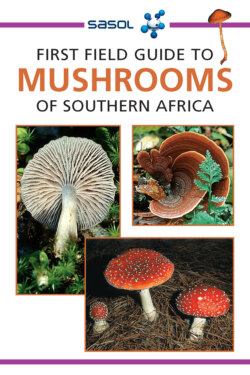Читать книгу First Field Guide to Mushrooms of Southern Africa - Margo Branch - Страница 13
На сайте Литреса книга снята с продажи.
Poisonous or edible mushrooms
ОглавлениеMost mushrooms are inedible. Extreme caution should be exercised before eating any mushroom. If a mushroom does not comply with all the features described it should not be eaten. Within this book, where appropriate, the edibility or toxicity of a mushroom is indicated by the symbol at the top of the page. For edible species, simple recipes are suggested where appropriate. For poisonous species the type of poisoning and symptoms are given.
Types of mushroom poisoning
1. Degeneration of internal organs, the liver and kidneys
The Death Cap is the cause of 90% of all mushroom fatalities and takes 6–30 hours to act.
2. Harm to the nervous system
a) Muscimol toxins found in the Fly Agaric, Panther Cap, Inocybe, Panaeolus and Clitocybe act within 5–30 minutes, cause blurred vision, convulsions, delirium and lowered heart rate and blood pressure. They can be fatal.
b) Hallucinogenic toxins, similar to LSD, are found in the genera Psilocybe, Conocybe and Gymnopilus, and can be fatal.
3. Gastrointestinal upsets
Seldom fatal, these are caused by the Yellow Staining Mushroom, Green-gilled Parasol, and Copper Trumpet. The Common Ink Cap causes gastrointestinal upsets if eaten with alcohol.
Begin by learning the following easy-to-identify mushrooms:
Common poisonous mushrooms
| Death Cap | p. 13 |
| Fly Agaric | p. 12 |
| Panther Cap | p. 14 |
| Copper Trumpet | p. 31 |
| Brown Roll-rim | p. 31 |
| Poison Pie | p. 34 |
| Umbo Toadstool | p. 35 |
Common edible mushrooms
| Field Mushroom | p. 20 |
| Shaggy Ink Cap | p. 24 |
| I’kowe | p. 26 |
| Oyster Mushroom | p. 28 |
| Pine Ring | p. 30 |
| Chanterelle | p. 39 |
| Cep (Boletus) | p. 40 |
| Chicken of the Woods | p. 44 |
